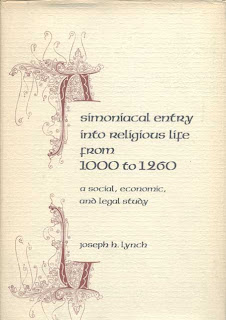
Simoniacal Entry into Religious Life from 1000 to 1260
A Social, Economic, and Legal Study
Joseph H. Lynch
Simony, the purchasing of religious office, was a common practice of the medieval church that was by no means universally condoned. Considered today, centuries later, it seems a quaint misdeed, an infraction of the ecclesiastical code inevitably diminished by the grosser crimes of the age. But if the term is properly and carefully defined, it denotes a concept of enormous assistance in reaching an understanding of that uniquely important medieval institution, the monastery.
Throughout the Middle Ages, religious orders were concrete expressions of a pervasive aspiration to the perfect life, which, it was steadfastly proclaimed and commonly believed, could best be achieved through hard work and diligent prayer in a rigidly structured community where men lived in a poverty that was self-imposed and in obedience to a stringent discipline that they freely accepted. But though religious communities claimed freedom from worldly concerns, they played, in point of fact, a major and crucial role in secular affairs.
At no point did the life of the cloister intersect more consequentially with that of the larger society than in the recruitment of novices. In undertaking to identify who entered the monasteries, why they chose and were chosen to do so, and under what conditions they were admitted, Joseph H. Lynch discovers that entries into religious life represented transactions of major social and economic significance to both the entrants and the communities that received them. Protracted and involved negotiations often preceded admission, whether the candidate was a member of the nobility aspiring to high office within the hierarchy, or a commoner seeking a humbler post. The medieval abbot was accustomed to engaging in what may quite properly be termed diplomacy as an important means to his ends. He bargained with his peers and superiors for gifts and preferences, and sought concessions from, and made compromises with, his adversaries. It was characteristic, too, that he achieved economic ends through means that, on the surface, appeared religious. In the negotiations that were the efficient means of his governance, recruitment was one of the most valuable tools at his disposal.
Ironically enough, in the twelfth century the church itself was to foster the very institution from which came those opponents of simony that brought about its end, and thereby deprived the religious houses of an important source of economic support and bargaining power. For it was those canon lawyers newly trained at the emergent universities who began seriously to question the propriety of the practice, and who, in so doing, were to precipitate changes in whole areas of medieval sensibility that were profoundly to affect future developments in art, architecture, literature, philosophy, education, economics, and government.